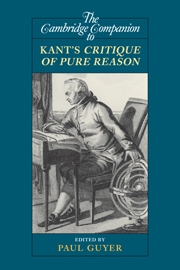Book contents
- Frontmatter
- Introduction
- Part I The Background to the Critique
- Part II The Arguments of the Critique
- Part III The Impact of the Critique
- 14 The Reception of the Critique of Pure Reason in German Idealism
- 15 The “Transcendental Method”: On the Reception of the Critique of Pure Reason in Neo-Kantianism
- 16 The Critique of Pure Reason and Continental Philosophy: Heidegger’s Interpretation of Transcendental Imagination
- 17 Kant’s Critique of Pure Reason and Analytic Philosophy
- Bibliography
- Index
17 - Kant’s Critique of Pure Reason and Analytic Philosophy
from Part III - The Impact of the Critique
Published online by Cambridge University Press: 28 July 2010
- Frontmatter
- Introduction
- Part I The Background to the Critique
- Part II The Arguments of the Critique
- Part III The Impact of the Critique
- 14 The Reception of the Critique of Pure Reason in German Idealism
- 15 The “Transcendental Method”: On the Reception of the Critique of Pure Reason in Neo-Kantianism
- 16 The Critique of Pure Reason and Continental Philosophy: Heidegger’s Interpretation of Transcendental Imagination
- 17 Kant’s Critique of Pure Reason and Analytic Philosophy
- Bibliography
- Index
Summary
This chapter considers three key works of analytic Kantianism: Clarence Irving Lewis, Mind and the World Order (1929); Sir Peter Strawson, The Bounds of Sense (1966); and Wilfrid Sellars, Science and Metaphysics: Variations on Kantian Themes (1968). We begin with some characteristics of early analytic philosophy that framed analytic philosophers' views of Kant's Critique of Pure Reason. Early Anglophone analytic philosophy came to focus on language. Ordinary language analysis contends that philosophical problems arise from decoupling terms or phrases from their ordinary contexts of use, in which alone they have definite use and meaning; it tends to a therapeutic approach to philosophy. What may be called “ideal language” analysis (broadly speaking) contends that philosophical problems arise through the use of the “material” mode of speech - that is, ordinary speech about persons, things, or events, to formulate philosophical problems; diagnosing and solving or dissolving these problems requires ascending to a constructed “formal” mode of speech, which restates those issues concerning sentences or statements. Though such philosophy can be therapeutic, most versions tended to more ambitious, constructive philosophical analyses.
- Type
- Chapter
- Information
- The Cambridge Companion to Kant's Critique of Pure Reason , pp. 401 - 430Publisher: Cambridge University PressPrint publication year: 2010
- 12
- Cited by



